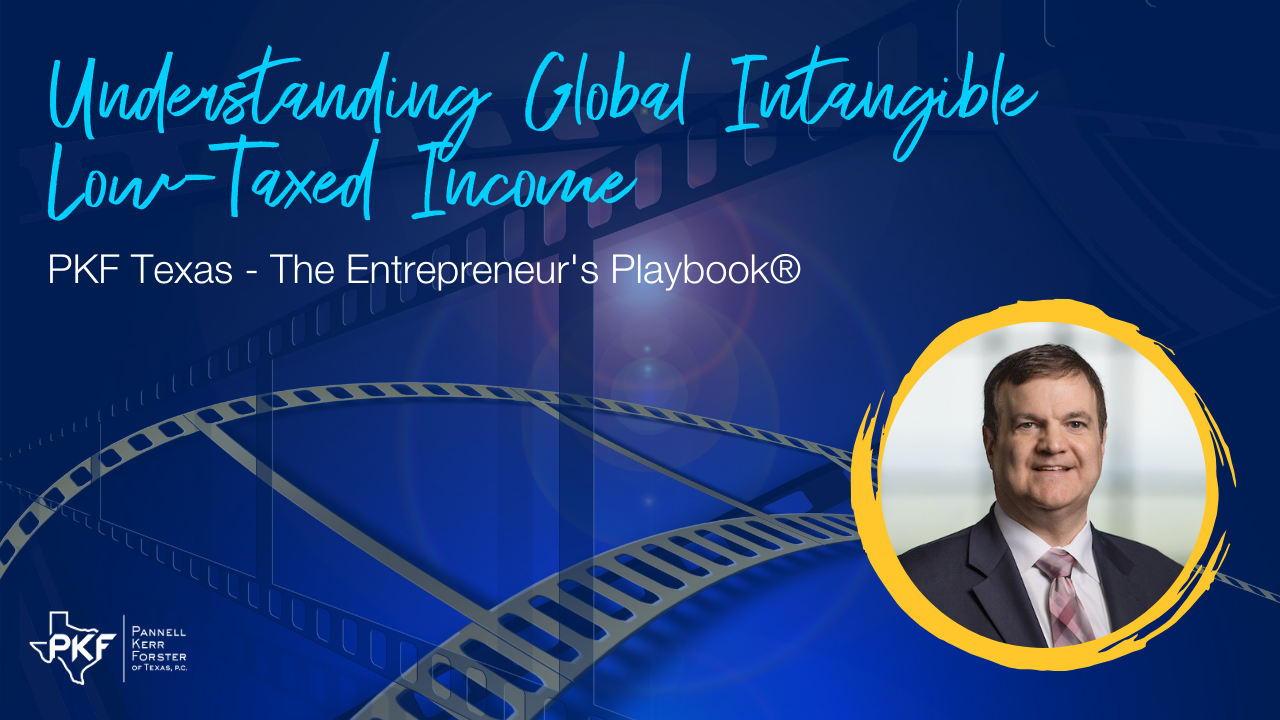Understanding Global Intangible Low-Taxed Income

Join Jen Lemanski and Frank Landreneau, Approachable Advisors™ and leader of PKF Texas’ international tax practice, as they delve into the complexities of Global Intangible Low Taxed Income. Discover how this post-tax reform concept impacts middle-market companies and gain insights into potential remedies. Stay informed with this advice on navigating international tax challenges.
Jen: This is the PKF Texas – The Entrepreneur’s Playbook®, I’m Jen Lemanski, and I’m here once again with Frank Landreneau one of the Approachable Advisors™ and a leader of our international tax practice. Frank, welcome back to the Playbook.
Frank: Thanks for having me, Jen.
Jen: So, we’ve talked about a number of international tax things over the years, and one that I’d like to know a little bit more about is the global and tangible low taxed income. What is it and how does it impact middle market companies?
Frank: That’s a great question, and actually I had this come up with a client of mine fairly recently. So, it is a topic that taxpayers even many years after tax reform we’re still grappling with. It’s a fancy word that really is misleading because basically what has happened after tax reform is that there isn’t any deferral with regard to foreign active business income anymore, with exception of a little bit of a haircut that it’s formulaic, and I’m not going to go into that. But basically, the whole idea behind all this was to broaden the tax base and then lower the rate. However, some of the rate lowering pieces of it didn’t really apply to individuals or companies doing business as individuals like pastor entities, like partnerships and so forth. What it really is, is the ability to pick up this income or the requirement to pick up this income were before tax reform that wasn’t required. So, it’s not really special type of income. It’s normally trader active business income that gets taxed. Now for corporations, it gets taxed at about a 10.5%. But because individuals don’t get special provisions, like the deduction that gets the rate to 10.5%, they get taxed at a normal ordinary income rate.
Jen: What are some potential remedies to this situation?
Frank: So, there’s a couple of them that are elections that you can make every year depending on what the fact pattern is, and there’s also some structural ones. The structural ones are more difficult because they involve taxable transactions or transactions that you’re going to pay some kind of income tax. But the others are elections. So, of the elections, one is the guilty high tax exception. The idea is that if you’re paying a tax that overseas on this foreign income that’s at a rate at least 90% of the US corporate rate, which gets you to about 18.9% rate, and you’re going to compute it under US tax principles. Then that income is not taxed and it can be excluded from the guilty computation. So, that’s one of the options. The other one is a 962 election, which we can go into a little later. And then the other one is to restructure and we can talk about that more. It involves elections, but it’s also involves a taxable event.
Jen: And when do folks make these elections?
Frank: Typically they make them annually on an extended return. So, you can kind of see how you know, get your books and records in order, close the year, and then you can kind of make that election on an extended return. It’s far out into the year as far as October typically.
Jen: Perfect. Well, sounds like we’ve got a couple more things to talk about next time. Sound good?
Frank: Thank you. Yes, I’d love to be back.
Jen: Awesome. This has been another Thought Leader production, brought to you by PKF Texas – The Entrepreneur’s Playbook®. For more information about this and other topics, visit pkftexas.com/insights. Tune in next week for another chapter.

